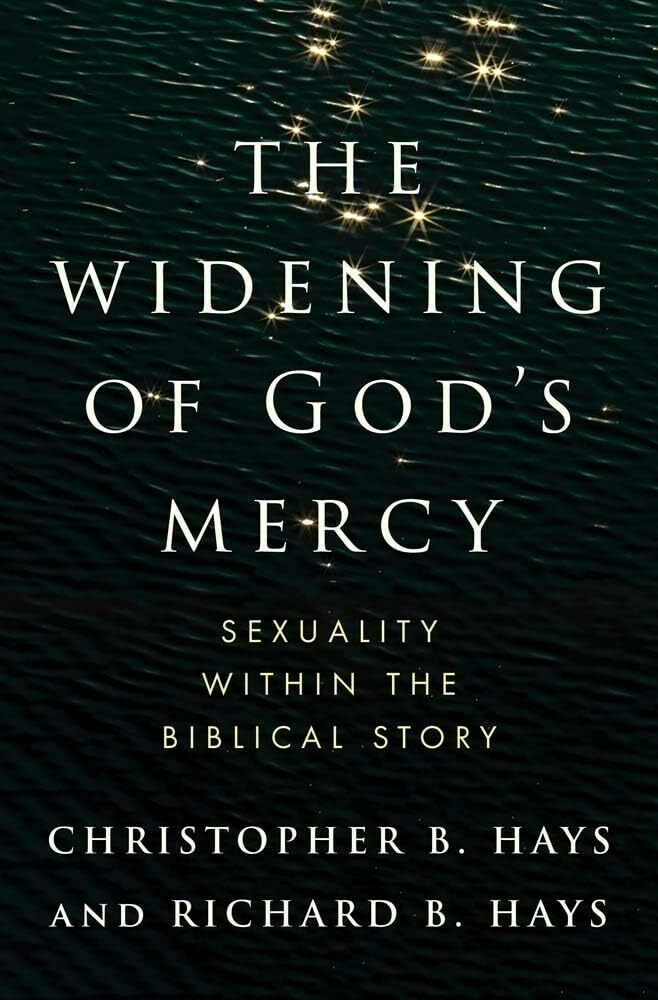Review: The Widening of God's Mercy by Drs. Christopher and Richard Hays
There was no small amount of buzz accompanying the announcement of The Widening of God’s Mercy’s publication. Father and son, both Biblical scholars of some renown, publishing a volume where the elder would reverse his public and well-known position about same-sex relationships is not an event that most anyone had on their Evangelical Christianity 2024 bingo card. I was not immune to the anticipation, immediately pre-ordering the book. My eagerness was tempered only by the depth of my to-read shelf, which means I am only now reading and commenting on this book.
[Note: I found out only hours before writing this post that Dr. Richard Hays passed away less than two weeks ago at the age of 76, as the result of pancreatic cancer. May he rest in peace and rise in glory.]
The Widening of God’s Mercy, written by Dr. Richard B. Hays and his son Dr. Christopher B. Hayes, describes a stunning change of position on Christian acceptance of same-sex relationships. Richard had, in his 1996 book The Moral Vision of the New Testament, argued against their acceptance. His book has been used as a primary authority by many evangelicals over the past three decades, interpreting a handful of New Testament verses seemingly opposed to homosexuality as conclusive. And so this book comes as a genuine surprise. The book is concise, clear, easily readable, generous, and contrite. And yet for the life of me I can’t understand why this was their chosen approach to the question.

Widening makes the case that a careful reading of the Bible will show, contrary to traditional theological assertion, that God frequently changes his mind, being influenced by humans who appeal to God. The book is structured in three parts. The first part deals with Old Testament texts; the second with the New Testament, and the brief third part drawing conclusions.
Old Testament
The OT section is the most convincing in that respect, discussing texts from Genesis through the Prophets where the text blatantly describes God changing his mind. Traditional interpreters might argue instead that since God is, per theological agreement, unchangeable, that these texts must mean something more like humans came to a new understanding that looked like God changing God’s mind. Drs. Hays choose instead to take the text at face value: God changes his mind, and almost always in favor of more mercy and more inclusion. Good enough so far.
New Testament
The New Testament doesn’t include (at least to my recollection) any passages that explicitly describe God “changing his mind”. The second section of this book instead reviews a multitude of cases in the Gospels where Jesus brings a new, more expansive, more merciful interpretation of the OT law. Healing is appropriate on the Sabbath. Women are treated as fully equal to men. Prostitutes and sinners are embraced, not rejected.
It then spends its most significant time in Acts, examining Peter’s vision and experience with Cornelius, resulting in the church’s acceptance of Gentiles. This is the key interpretive text for the Hays’ as they argue for LGBTQ inclusion. They suggest three steps discerned from the Acts account of the subsequent Jerusalem Council that could be used for the church today in similar re-evaluations of understanding:
- The community’s discernment depends on imaginative reinterpretation of scripture.
- The community’s discernment depends on paying attention to stories about where God was currently at work.
- The discernment is made in and by the community.
This, too, is good as far as it goes. The church community should work together with the Spirit to discern God at work and how our understanding of God’s work needs to change over time.
And yet…
But this is where the book’s argument struggles. The section on the NT never argues that the NT accounts represent God changing his mind. It argues for the church’s “creative reinterpretation” of Scripture based on the leading of the Spirit, but the authors don’t try to argue that this represents a change of God’s mind. One could just as reasonably argue (as I think is more common) that God’s mind has always been for mercy and inclusion, but that humans have progressively had a clearer understanding of God’s mind over time.
If God’s change of mind is how we understand these interpretive evolutions, I am also left wishing for more insight into how we know that God’s mind has changed. What’s the trigger? The authors point to a series of interpretive changes of the past — they mention the acceptance of slavery as an example — but leave the how to the reader’s imagination. (They also ignore the many historic voices who spoke out against slavery even when the official voice of the church accepted it. Had God’s mind already changed and the church was just slow to catch up?)
Let me explain. No, it’s too much, let me sum up.
Am I happy where the authors have landed in their views of sexuality? Yes. Is it very heartening to see men admit their change of heart in public? For sure. But is their argument compelling? In my opinion, no, it’s not. I am sympathetic to arguments that God can change. It’s certainly the easiest way to deal with all the texts that say God changes his mind, and also the easiest way to think, say, about the efficacy of prayer. But the book fails to tie that idea to believers’ renewed understandings in the New Testament, and progressive revelation seems to me a much more reasonable interpretation given the textual evidence.